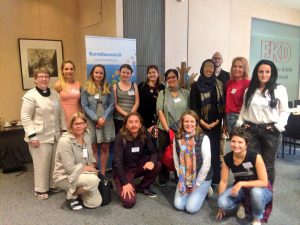 One 29th and 30th June 2017, Eurodiaconia hosted its ‘Training 4 Trainers’ event in Brussels, as part of the ongoing Erasmus+ project “Empower You(th)! Training of innovative models and methods in youth work”. In order to support young people in facing contemporary challenges such as multiculturalism, digitalization and social exclusion, the project aims to deliver youth workers with the necessary knowledge, skills and competences on how to best tackle today’s challenges.
One 29th and 30th June 2017, Eurodiaconia hosted its ‘Training 4 Trainers’ event in Brussels, as part of the ongoing Erasmus+ project “Empower You(th)! Training of innovative models and methods in youth work”. In order to support young people in facing contemporary challenges such as multiculturalism, digitalization and social exclusion, the project aims to deliver youth workers with the necessary knowledge, skills and competences on how to best tackle today’s challenges.
To this end, the Training 4 Trainers event brought together youth workers from 6 countries across Europe, in order to allow the exchange of best practices in youth work, to discuss diverse innovative methods, and to develop these methods to be applied in various geographical settings.
The two-day training brought together youth workers from the organisations participating in the project, including Svenska Kyrkan from Sweden, Kirkens Bymisjon from Norway, Diakonie Kosova from Kosovo, Slezská Diakonie from the Czech Republic, Diaconia Valdese from Italy and as a partner, the Armenia Round Table Foundation from Armenia.
The event began with the opportunity to reflect on current challenges for young people in Europe today, building on the initial project aim; to provide innovative methods for youth workers to enable young people to better face today’s contemporary challenges. Eurodiaconia’s Youth Work Mapping in Europe, a research paper exploring the current state of youth work in various country contexts was also presented by Florian Tuder (Eurodiaconia). To follow, participants heard about the Commission’s “Youth work quality systems and frameworks in the EU” from DG Education, Youth, Sport and Culture’s Ellen Durst, who presented the handbook ‘Improving Youth Work’.
The overarching objective of the Training 4 Trainers event was for organisations involved in the project to get acquainted with other organisations and participants, to share best practice on youth work, and to analyse these methods. As such, all project organisations had the opportunity to share and discuss their chosen youth work method, ranging from ‘forum theatre’ in Norway, to children’s summer camps in Italy. At the end of the first day, three methods were selected by participants to explore in more depth the following day. On the second day of the event, several ‘Open Space’ sessions allowed participants to analyze the selected methods, and to deepen evaluation and discussion of these methods, in order to visualize how they might be applied to diverse geographical settings, and what obstacles might arise.
The gathering of the project participants will allow the project to develop an online toolkit, an accessible and practical tool that seeks to adapt youth work methods to current challenges, and two regional workshops which will see the exchange of practices applied to particular geographical settings, and multiply the results beyond the project team.